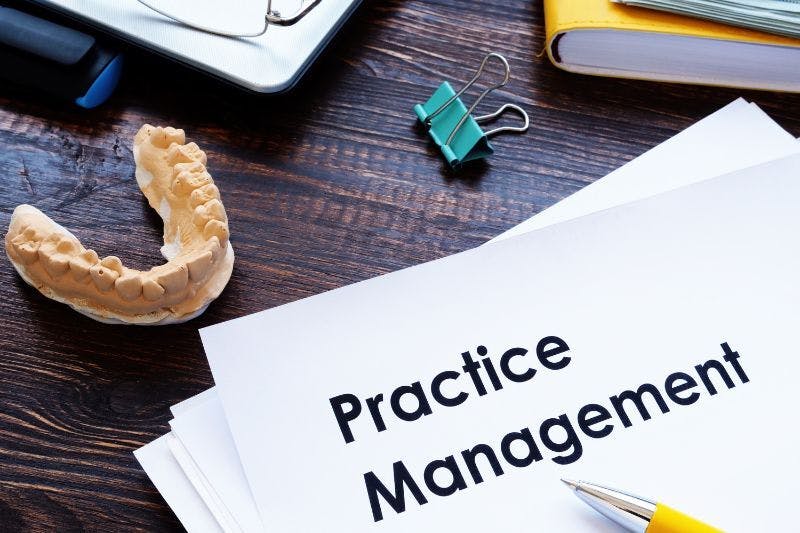
Tasha left the dentist's office, tears streaming down her face. For the first time in her life, she could face the world with a mouth full of beautiful teeth. Perfectly straight, perfectly white. She couldn’t stop grinning. The practice manager encountered her on the way out, and Tasha couldn’t stop thanking everyone who had played a part in restoring her smile.
As the team watched her leave, they gave each other a knowing look that only the back office of a dental practice could understand.
After taking a few moments to enjoy their victory, everyone returned to their tasks. Surprisingly, the real heroes of Tasha’s story were not only the dentist or the maxillofacial surgeon, but also the CPA firm that set down efficient billing, claims, and expense management systems that enabled the work on Tasha’s teeth to continue without hindrance for 18 months.
Are you a dental practice owner looking to streamline your accounting and billing processes? Discover how efficient financial management can ensure your patients receive the best care possible. Contact us today for a consultation with our experienced CPA team.
The challenges of managing a dentistry practice

Image courtesy of Canva/Getty Images
As a practice manager, perhaps you have faced the following challenges:
Never-ending reconciliations between patient payments and insurance payouts
Incorrect account statements were sent to clients because they were managed manually
Overdue bills, with month-end chaos as the front office team scrambled to phone clients and collect money
Billing procedures that did not align with insurance and HIPPA requirements in some way
The late or incorrect allocation of expenses
Payroll processing, done late at night when she could find a quiet moment
Haphazard cash flow management, with no established cash reserve
If you have, you know the frustration associated with keeping a dental firm’s books sorted out. You need to keep everything running smoothly and keep the doors open, so what’s the solution?
Keeping the doors open and the practice thriving

Image courtesy of Canva/Macniak
Without a speedy solution to these challenges, this business model soon becomes unsustainable, with many practices battling to keep the doors open, once their accounting gets messy and complicated. There was only one solution - find bookkeeping services quickly!
How can an experienced accountant help?
The success of using a CPA firm lies in having experienced accountants who know what is required in dental practices. They offer accounting services but they also work with the practice manager or owner to secure the financial health of the practice.
They understand it is important that all financial obligations to suppliers are met because no dentist can operate without the modern technology that has revolutionized dentistry.
The careful interplay of receiving payments from the insurance and purchasing supplies only when needed is challenging, and experienced accountants understand what processes to put in place to manage purchases, expenses, and cash flow.
If your dental practice is looking for local accounting professionals to help you manage your financial transactions, provide bookkeeping services, and give you detailed financial reports then give Hall Accounting Company a call. Not only can they provide you with financial planning but also ensure that you make good use of allowable tax deductions and submit your tax returns.
Speak to an accounting professional and get your financial goals on track
Still unsure? Here are 10 challenges common challenges faced by the dental industry. Why try to manage these challenges yourself when you could get help and go back to doing what you love?
10 common challenges faced by dental practices

Image courtesy of Canva/Kzenon
Dental practice management isn’t for the faint-hearted. Many times highly experienced practice managers find themselves overwhelmed by all the elements of financial management and financial tasks of a dental practice.
New practice owners who try to manage on their own also soon find they are snowed under with administrative burdens and spend less time providing the patients with what they need.
These 10 challenges are shared by most dental practices, and if you recognize most of them, don’t feel discouraged. Your practice’s financial health can be improved by getting the right help.
Patient Billing and Collections: Dealing with a mix of insurance claims and direct patient payments is complex. Tracking various insurance plans, copayments, and patient balances takes time and resources. If done manually, this delay in insurance reimbursements will affect cash flow.
Expense Tracking: Dental practices incur various expenses, from dental supplies and equipment to staff salaries and office maintenance. Properly categorizing and tracking these expenses is vital for accurate financial reporting and tax preparation.
Revenue Recognition: Revenue recognition is an aspect of accrual accounting that stipulates when and how businesses “recognize” or record their revenue. The principle requires that businesses recognize revenue when it's earned (accrual accounting) rather than when payment is received (cash accounting). Understanding when to recognize revenue can be tricky, especially with treatments that span multiple billing periods or require upfront payments. An accounting firm will help you to apply the correct accounting principles to your practice.
Compliance and Regulations: The healthcare industry, including dental practices, is subject to numerous regulations, including those related to patient privacy (HIPAA in the U.S.) and financial reporting standards. Ensuring compliance is critical to avoid legal and financial penalties and having someone who knows the rules and keeps your books according to those rules, takes a lot of weight off you.
Payroll Management: Managing payroll for your staff, including dentists, hygienists, and administrative personnel, requires attention to detail, especially with varying pay scales, benefits, and potential overtime payments. An accountant can recommend software that is suitable for all your payroll needs and can set up workflow rules for the processing of salaries, ensuring the accuracy you need.
Tax Planning and Preparation: An accounting service can help you navigate complex tax laws, including deductions for equipment purchases, allowable expenses, and employee benefits.
Cash Flow Management: A significant benefit to hiring an accounting firm, is the management of cash flow and the financial health that comes from accurately balancing income from patients and insurance with outgoing expenses. Regular reports, or even direct access to cash flow information help you to make sound business decisions.
Technology and Software Integration: The correct technology and software for your practice is a key aspect of a well-run dental practice. Your software needs are unique in that the accounting package must be able to process claims, receive payments, and recognize revenue over multiple billing periods, as well as handle expense claims. Your accountant will know what the right system is, and will likely introduce automation for the processing of manual data, quickly and efficiently.
Financial Reporting and Analysis: Regular financial reporting is essential to understanding the financial health of your practice and making informed business decisions. Accounting firms provide their clients with valuable reports, the accuracy of which will be reliable, helping you to make confident business management decisions.
Debt Management: If you have loans for your practice (e.g., for equipment or startup costs), managing and planning for these debts is important. An experienced CPA knows how to manage these debts on your behalf and will make recommendations about investment strategies that will help you plan debt repayment.
A plan for straightening out your books

Image courtesy of Canva/Getty Images
So far we’ve looked at the challenging nature of securing your practice’s financial health. We’ve also provided basic insight into how an accounting firm will be of value to your business.
If you’re ready to speak to an accountant, go ahead and schedule a call with one of our experienced CPAs at Hall Accounting Company. But if you’d like to know more about the strategies that could be employed to get your books on track, then keep reading.
Implementation of Patient Billing and Collections Solutions
Specialized Dental Billing and Practice Management Software
Implement software designed for dental bookkeeping that can handle diverse billing scenarios, including insurance claims processing and direct patient billing.
Automated Reminder System for Patient Payments
Set up a system that sends automated reminders to patients for upcoming or overdue payments. This can be via email, SMS, or through a patient portal, reducing the time spent on manual follow-ups.
Expense Tracking Solutions
Automated Expense Categorization
Use accounting software that automatically categorizes expenses based on predefined rules. This helps in accurate budgeting and financial reporting.Regular Expense Report Reviews
Schedule monthly or quarterly reviews of expense reports to identify trends, unnecessary expenditures, and opportunities for cost savings.Staff Training on Expense Recording
Conduct training sessions for your staff to ensure they understand how to record expenses correctly, which is crucial for maintaining accurate financial records.Revenue Recognition Solutions
Accrual-Based Accounting Software
Implement software that supports accrual-based accounting, allowing you to recognize revenue when earned, not just when received. This is important for treatments that span multiple billing periods.
Revenue Recognition Guidelines
Establish clear guidelines for recognizing revenue, especially for complex cases like multi-period treatments or prepaid services.
Tax Planning and Preparation Solutions
Detailed Record-Keeping for Deductions
Maintain meticulous records of all expenses that are deductible, including equipment purchases and office expenses.
Year-Round Tax Planning
Instead of waiting for year-end, plan for your tax liabilities throughout the year to avoid surprises and manage cash flow better.
Cash Flow Management Solutions
Regular Cash Flow Monitoring
Use accounting software to monitor your cash flow regularly, identifying trends and potential issues early.
Establishing a Cash Reserve
Set aside funds to create a financial buffer for unexpected expenses or fluctuations in income.
Efficient Management of Accounts Receivable and Payable
Implement policies for timely collection of receivables and judicious payment of payables to maintain a healthy cash balance.
Why you should consider dental accounting services
To put it plainly, dental professionals don’t have the time or professional accounting knowledge about accounting principles, tax laws and regulations, and accounting compliance.
Running a practice efficiently is always the end goal for future growth, but it takes valuable insights that are not the core competency of dentists.
Let’s put it another way. Your patients wouldn’t want an accountant doing complex dental surgery on them, and you probably shouldn’t try to be an expert in accounting and tax compliance. If everyone stays in their lane, something beautiful can come of it. Like Tasha’s new smile.
Let’s create a partnership based on trust and the future success of your business.